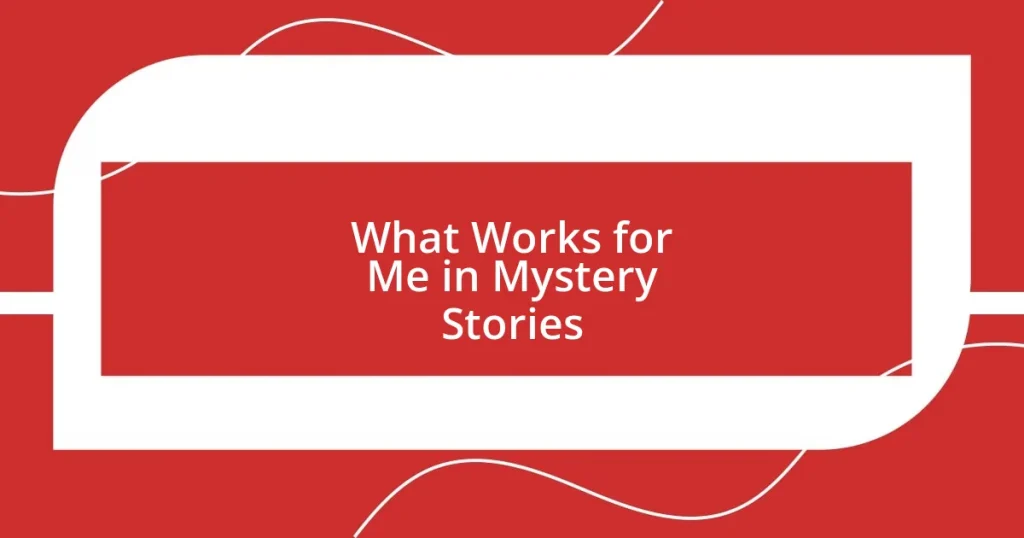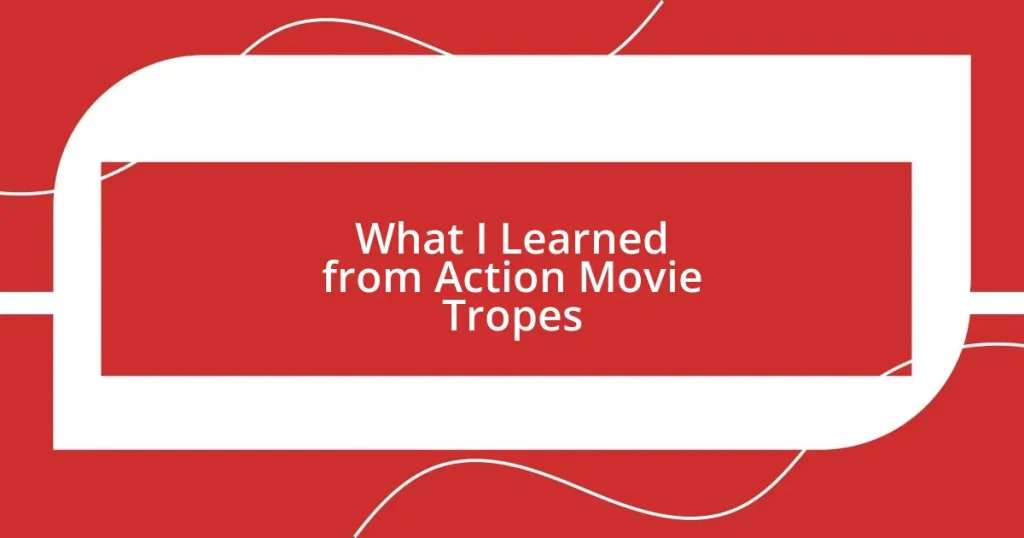Key takeaways:
- Box office success is influenced by emotional connections, relatable themes, and effective marketing strategies.
- Top-grossing films often resonate through unique storytelling and timing, tapping into cultural moments and audience emotions.
- Franchise successes rely on expansive world-building, evolving characters, and the necessity for reinvention to maintain audience interest.
- Future trends in cinema will likely be shaped by streaming services, AI analytics, and immersive theater experiences that enhance viewer engagement.
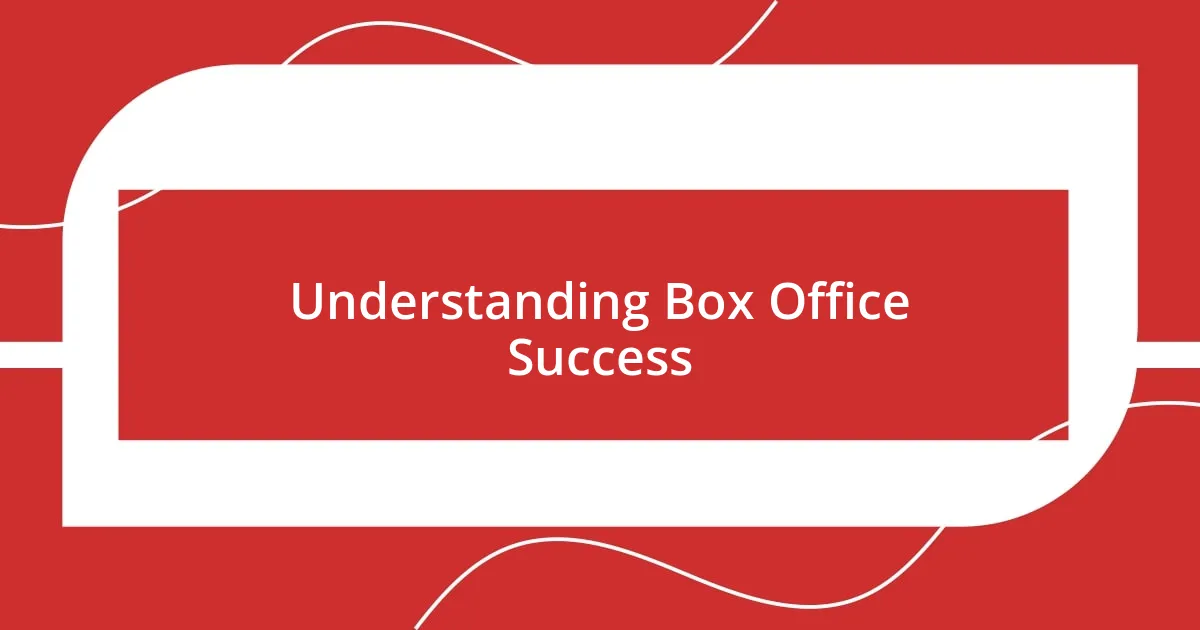
Understanding Box Office Success
Box office success goes beyond just the numbers; it’s about the connections that films create with their audiences. I still remember the excitement I felt waiting for the release of a blockbuster, feeling like part of something bigger than myself. Have you ever wondered why certain movies resonate deeply while others fade away? It often comes down to timing, marketing, and, most importantly, the emotional appeal of the story.
Financial gains are just part of the puzzle. For me, experiencing a movie that not only captures my heart but also sparks conversations long after is a true success. Take, for instance, a film that tackles sensitive social issues—like “Black Panther”—which not only drew massive crowds but also created a cultural movement. Isn’t it fascinating how movies can shape our perspectives and unite people?
Moreover, stellar performances from actors can elevate a film, making it memorable for audiences. I reflect on my own feelings after watching a gripping drama or an inspiring hero’s journey; it’s those moments that keep us returning to the cinema. Isn’t it captivating how some stories linger in our minds, influencing our emotions and encouraging us to share our experiences? These elements combined can turn a standard release into a phenomenal box office success, proving that the heart of cinema lies in its power to connect.

Key Factors Behind Success
One of the key factors behind a film’s success is its ability to evoke strong emotions. When I watch a movie that makes me laugh, cry, or even rage, it often stays with me for days. I recall seeing “The Pursuit of Happyness”—it was more than just a film to me; it was an inspiring journey that made me reflect on my own struggles and triumphs.
Factors that contribute to box office success include:
- Relatable Themes: Stories that resonate with personal experiences draw audiences in.
- Effective Marketing: A well-executed marketing strategy can create buzz and anticipation.
- Timing: Releasing during a holiday or a social movement can boost visibility.
- Star Power: Well-known actors can attract wider audiences just by their presence.
- Visual Appeal: Stunning cinematography and special effects can captivate viewers.
Ultimately, it’s a combination of these elements that work in harmony. When they align, magic happens on the big screen, and I find myself becoming part of the narrative unfolding before me.

Top Grossing Films Analysis
When analyzing top-grossing films, it’s essential to look at what made them resonate with audiences globally. For instance, “Avengers: Endgame” wasn’t just a box office phenomenon because of its star-studded cast but also because it wrapped up a decade-long story arc that fans deeply connected with. I remember the palpable energy in the theater; it felt like we were all part of something monumental together as we cheered and gasped during pivotal moments.
Comparing different box office hits reveals that the best performers often share a unique magic. For example, “Titanic” captivated audiences with a blend of romance and tragedy, while “Jurassic Park” thrilled viewers with groundbreaking visual effects and adventure. I can’t help but be fascinated by how a film can tap into our collective nostalgia, curiosity, or even fear, making us relive those feelings every time we hit play. These emotional triggers are crucial in driving ticket sales and ensuring a film’s legacy lives on long after its release.
Moreover, the timing and context of a film’s release can’t be overlooked in box office success analysis. Consider how “Black Panther” emerged during a significant cultural moment, sparking widespread discussions about representation and identity. I recall the pride I felt seeing diverse stories being celebrated on such a massive scale; it gave me hope for future storytelling in cinema.
It’s intriguing to observe that films released during certain times, like summer blockbusters or holiday seasons, tend to perform well due to increased audience availability and excitement. Reflecting on these dynamics, it’s clear that box office success isn’t just about numbers but about how films connect to a broader cultural moment and emotional landscape.
| Film Title | Gross Revenue |
|---|---|
| Avengers: Endgame | $2.798 billion |
| Titanic | $2.195 billion |
| Black Panther | $1.347 billion |
| Jurassic Park | $1.046 billion |
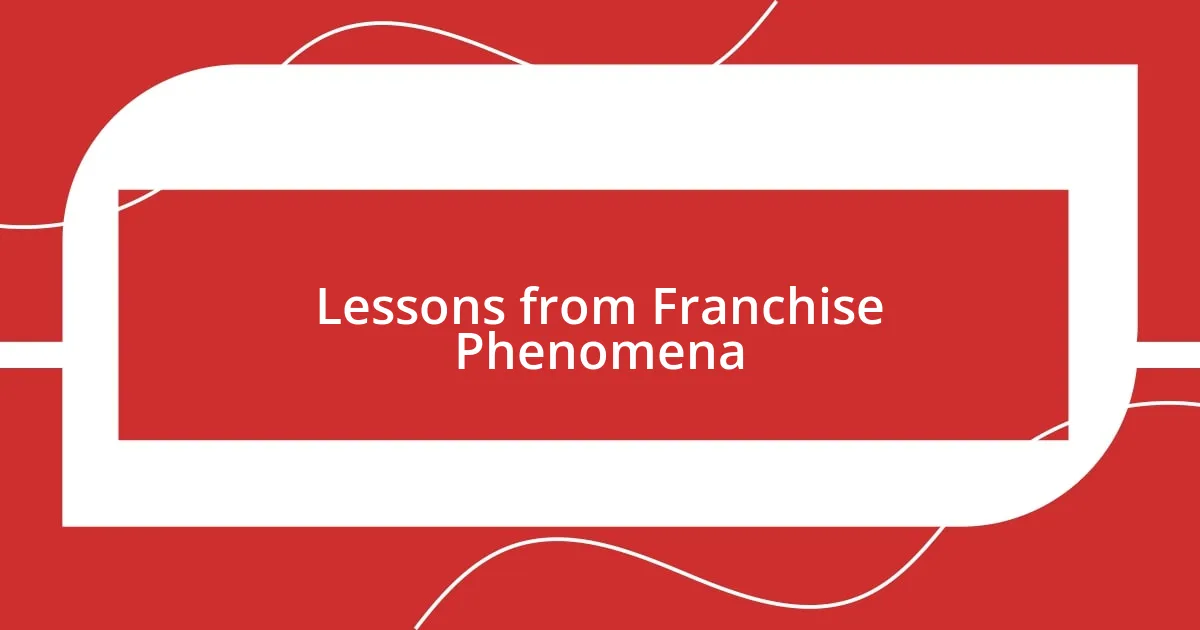
Lessons from Franchise Phenomena
Franchises like “Star Wars” and “Harry Potter” teach us the power of expansive world-building. I remember spending hours discussing theories with friends about plot twists and character arcs, immersed in a universe that felt alive. This kind of engagement transforms a movie into a lasting cultural phenomenon. Have you ever found yourself debating which Hogwarts house you’d belong to? It’s that level of connection that keeps fans coming back for more.
Another essential lesson from franchise successes is the importance of character development. Take “Fast & Furious”—it’s not just about cars; it’s about family, loyalty, and friendship. I recall feeling a sense of camaraderie as the characters faced insurmountable challenges together. When films create relatable, evolving characters, audiences invest emotionally, which often translates into box office returns.
Finally, the evolution of a franchise can highlight the necessity of reinvention. Look at how each new “Spider-Man” film brings its unique spin on a familiar tale. What I find fascinating is how audiences embrace these fresh takes while also cherishing the nostalgia of previous installments. It proves that while familiarity is comforting, innovation is necessary to keep the momentum going. How do you think future filmmakers can strike that balance?
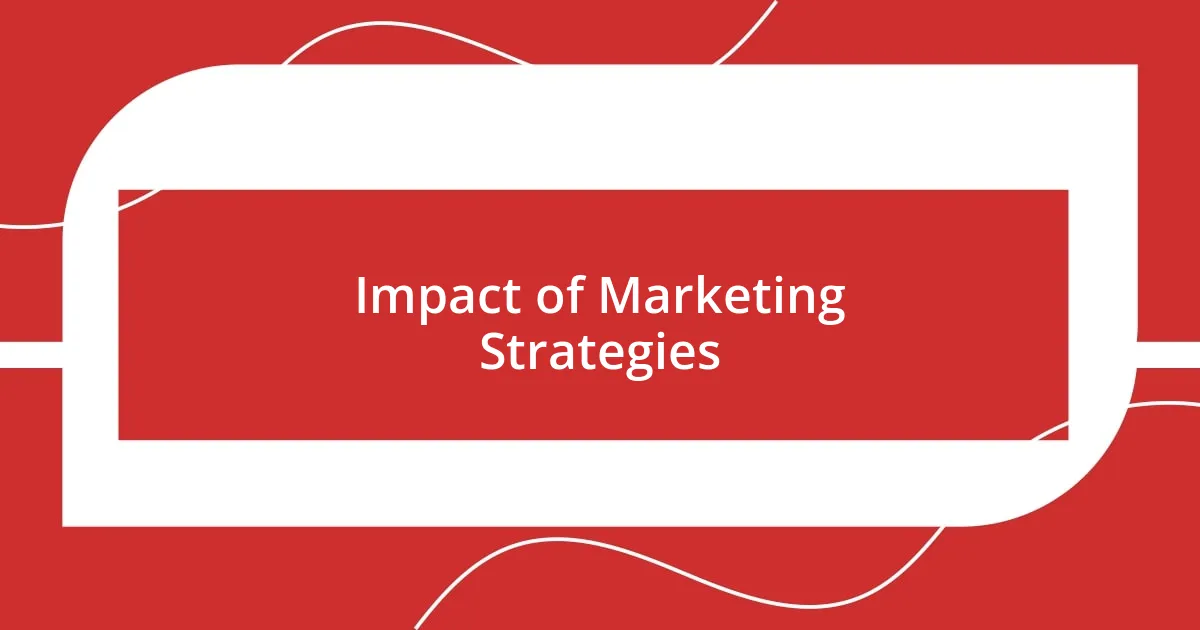
Impact of Marketing Strategies
When it comes to box office success, the impact of marketing strategies can’t be overstated. For instance, the way “Avengers: Endgame” was promoted felt like a global event. I still remember seeing those teaser trailers that left us hungry for more; it was a masterclass in building anticipation. Engaging with fans through social media and behind-the-scenes content made us feel like we were part of the journey.
Consider how influencers and fan events can amplify a film’s reach. I’ll never forget the buzz surrounding “Black Panther” when it released. The marketing didn’t just showcase the film; it celebrated the culture and community surrounding it. This connection deepened my emotional investment in the story. Have you ever been convinced to watch a movie just because of a vibrant online community rallying around it? It’s incredible how marketing can transform a film into a movement.
Then there are strategies like exclusive early screenings, which often generate a sense of urgency. I had a friend who attended a sneak preview of “Titanic” and couldn’t stop raving about it. His excitement fed into my desire to see it; I felt like I was missing out on something monumental. Those moments of buzz can create a ripple effect that significantly amplifies box office numbers, proving that engaging marketing can truly stir the public’s interest and cultivate a loyal audience.
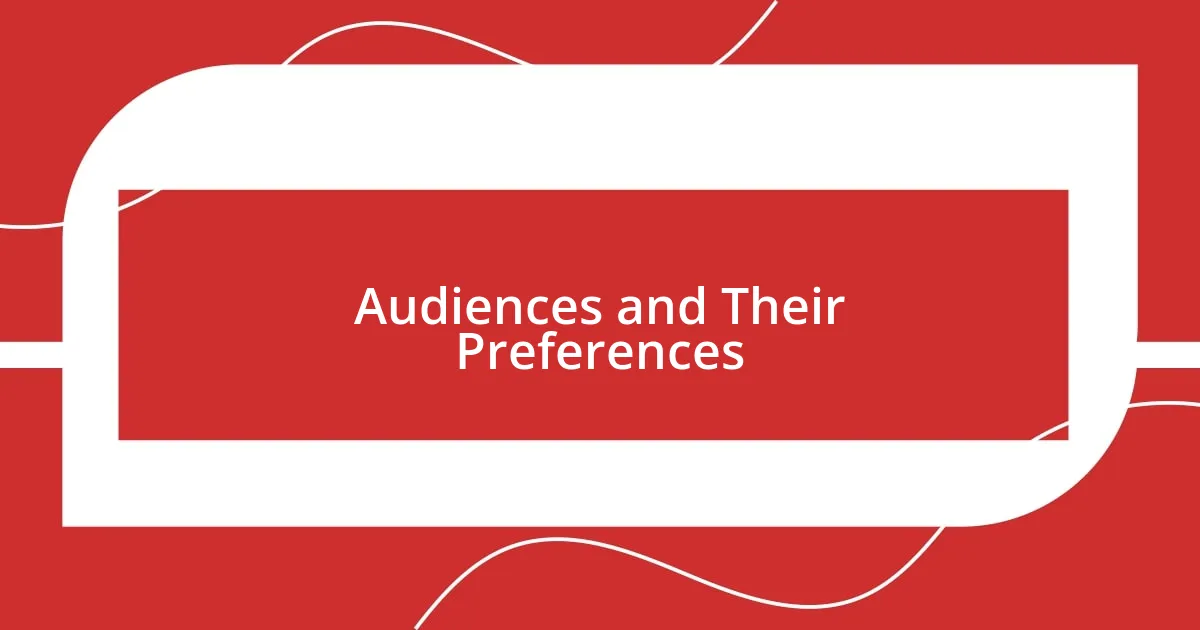
Audiences and Their Preferences
When it comes to understanding audiences, their preferences shift and evolve, often influenced by cultural trends. I remember attending a film festival where the buzz around unique storytelling—those gritty indie films—was palpable. Have you noticed how certain genres, like horror or romantic comedies, might resonate more strongly during specific times? It’s that underlying connection to our experiences that shapes what audiences flock to at the box office.
Audiences today are more vocal and engaged than ever, thanks in part to social media. I often find myself scrolling through my feed, captivated by reviews and recommendations from friends and influencers. It makes me wonder, how much do these conversations shape our movie choices? The communal aspect of choosing what to watch adds a layer of excitement that I think filmmakers can’t afford to overlook; it’s all about blending timeless narratives with the current societal landscape.
Moreover, the emotional tone of a film can significantly influence audience turnout. For example, during tough times, I’ve noticed a spike in people seeking uplifting stories. I remember binge-watching feel-good movies with friends on a gloomy day, hoping for a dose of positivity. It highlights how film preferences are not just about enjoyment but also about connection; audiences are drawn to stories that resonate with their current emotions and aspirations. What kind of stories do you find yourself turning to in various moments of life?
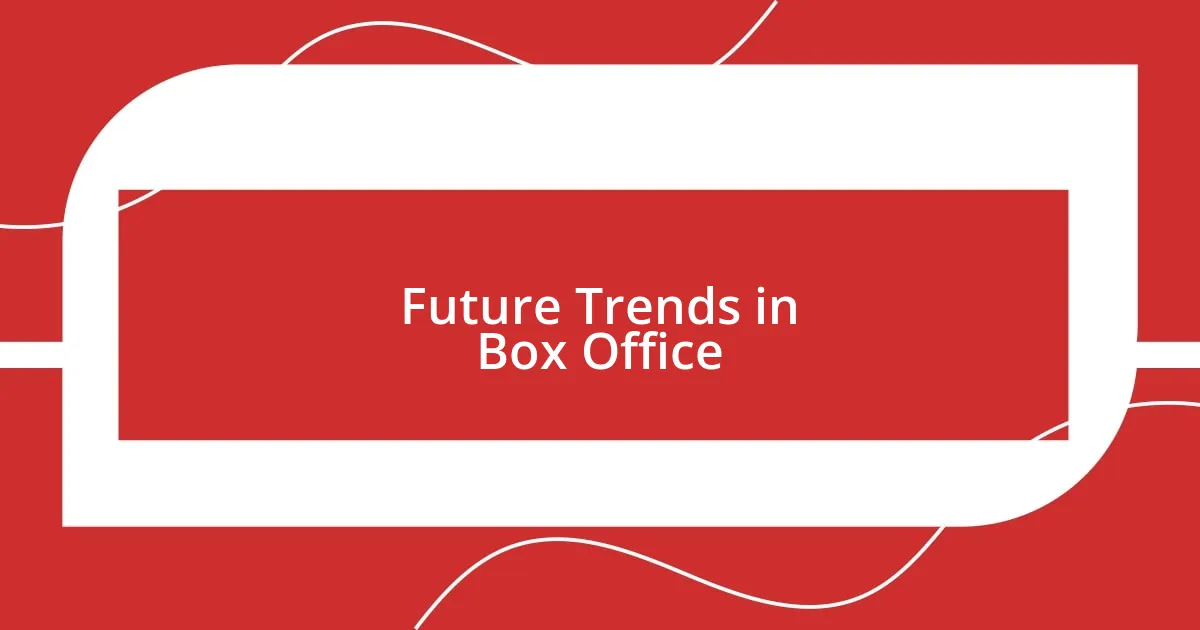
Future Trends in Box Office
As I look ahead to the future of box office trends, I can’t help but notice the growing importance of streaming platforms in shaping audience expectations. When I recently signed up for a subscription service, I found myself constantly torn between watching a blockbuster at the cinema or just waiting for it to drop online. Do you ever feel the same way? The convenience of home viewing may challenge traditional box office numbers, encouraging studios to innovate how they release films.
The rise of AI and data analytics could also play a pivotal role in how movies are developed and marketed. I recall a discussion with a filmmaker who mentioned using algorithms to analyze what viewers want from a movie—a clear sign of a changing landscape. Can you imagine a world where film storylines and marketing strategies are tailored based on viewer preferences? It’s both fascinating and a bit daunting to think about how data-driven decisions could redefine creativity in storytelling.
Additionally, I believe we’ll see a resurgence of immersive experiences in theaters. I recently enjoyed a film that incorporated 4D elements, making the viewing experience totally unforgettable. Have you ever sat in a theater where the environment enhanced the story? I think people will gravitate toward these multi-sensory experiences, as they add an exciting layer to traditional cinema and may even pull audiences back into theaters, eager for something beyond just watching on a screen.













